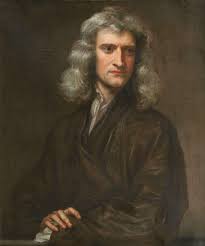One of the most renowned scientists in history is Sir Isaac Newton, an English physicist, mathematician, astronomer, and philosopher. Born on December 25, 1642, Newton’s contributions to various fields of science and his revolutionary ideas shaped our understanding of the physical world.
Interesting fact about Newton: One interesting fact about Newton is that he was primarily self-taught and made significant discoveries during his time of self-isolation. In 1665-1666, due to the Great Plague of London, Newton had to retreat to his family estate in Woolsthorpe. During this period, which later became known as his “year of wonders,” he made groundbreaking advancements in mathematics, optics, and physics.
Remarkable Inventions : One of Newton’s most remarkable inventions was his formulation of the laws of motion and the law of universal gravitation. In his seminal work, “Mathematical Principles of Natural Philosophy” published in 1687, Newton presented these laws, which laid the foundation for classical mechanics and became the cornerstone of physics for centuries to come.
Newton’s laws of motion describe the relationship between the motion of an object and the forces acting upon it. The three laws are as follows:
1. Newton’s First Law of Motion (The Law of Inertia): An object at rest tends to stay at rest, and an object in motion tends to stay in motion with the same speed and in the same direction unless acted upon by an external force.
2. Newton’s Second Law of Motion: The acceleration of an object is directly proportional to the net force applied to it and inversely proportional to its mass. This law is often expressed as the famous equation F = ma, where F represents the force, m is the mass of the object, and a denotes the acceleration.
3. Newton’s Third Law of Motion: For every action, there is an equal and opposite reaction. This law states that whenever an object exerts a force on another object, the second object exerts an equal and opposite force on the first.
Furthermore, Newton’s law of universal gravitation provided a mathematical description of the force of gravity between two objects. According to this law, every particle in the universe attracts every other particle with a force that is directly proportional to the product of their masses and inversely proportional to the square of the distance between their centers. This law elegantly explained the motion of celestial bodies and laid the groundwork for understanding the mechanics of the solar system.
Newton’s laws of motion and the law of universal gravitation revolutionized physics and formed the basis for classical mechanics. They provided a unified framework for understanding the motion of objects on both Earth and in space. Newton’s work not only advanced scientific knowledge but also had a profound impact on technological advancements and the way we perceive the world around us.
Contribution to the field of Optics: In addition to his laws of motion and the law of universal gravitation, Newton made significant contributions to the field of optics. One of his notable inventions in this domain was the reflecting telescope, which he developed in 1668. This telescope utilized a concave mirror instead of a lens to gather and focus light, resulting in clearer and more detailed images than the refracting telescopes of the time.
The reflecting telescope offered several advantages over its predecessors. By using a curved mirror to reflect and converge light, it eliminated many of the aberrations and distortions that plagued refracting telescopes. It also allowed for larger aperture sizes, enabling the capture of more light and thus enabling astronomers to observe fainter celestial objects. Newton’s reflecting telescope design became the foundation for subsequent advancements in telescope technology and influenced the development of modern telescopes.
Involvement in alchemy: Another intriguing aspect of Newton’s life was his involvement in the field of alchemy, a precursor to modern chemistry. While alchemy was a widely practiced discipline during Newton’s time, it is important to note that his alchemical pursuits were not as influential as his scientific achievements in physics and mathematics. Nevertheless, his alchemical studies revealed his fascination with the hidden forces and secrets of nature, which may have influenced his later scientific inquiries.
Newton’s contribution in Mathematics : Another interesting aspect of Sir Isaac Newton’s life is his significant contributions to the field of mathematics, particularly in the development of calculus.
Calculus is a branch of mathematics that deals with the concepts of change and motion. Newton, along with the German mathematician Gottfried Wilhelm Leibniz, is credited with independently developing calculus during the late 17th century. Newton’s development of calculus was motivated by his studies of motion and his desire to find a mathematical language to describe and analyze it.
Newton’s approach to calculus involved the concept of infinitesimal calculus, which dealt with quantities that approach zero. He introduced the fundamental principles of differentiation and integration, which are the two main branches of calculus. Differentiation involves finding rates of change and slopes of curves, while integration deals with finding areas under curves and solving accumulation problems.
Newton’s work in calculus was groundbreaking and provided a powerful tool for solving complex mathematical problems. It had far-reaching implications and found applications in various scientific fields, including physics, engineering, economics, and computer science. Calculus has become an essential part of higher mathematics and has greatly influenced our understanding and ability to model and analyze dynamic systems.
Moreover, Newton’s contributions to mathematics extended beyond calculus. He made significant advancements in the field of algebra, developed new methods for solving polynomial equations, and made important contributions to the study of infinite series. His mathematical achievements helped establish a solid foundation for the development of modern mathematics.
In summary, Sir Isaac Newton’s contributions to science, including his laws of motion, law of universal gravitation, invention of the reflecting telescope, and development of calculus, have had a profound impact on our understanding of the natural world.
His work revolutionized physics, astronomy, optics, and mathematics, and his ideas continue to shape scientific inquiry and technological advancements to this day. Newton’s genius and intellectual legacy have firmly placed him among the greatest scientists in history.
By: SIDHARTHA MISHRA
Write and Win: Participate in Creative writing Contest & International Essay Contest and win fabulous prizes.
















